
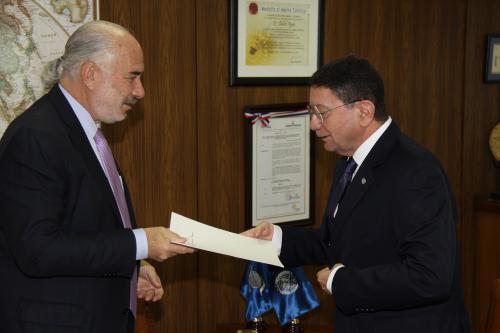
Ambassador of Colombia presents credentials to World Tourism Organization (UNWTO)
The Ambassador of Colombia, H.E. Mr Alberto Jacobo Furmanski Goldstein, has presented his credentials to the Secretary-General of the World Tourism Organization (UNWTO), Taleb Rifai, accrediting him as Permanent Representative of his country to UNWTO. UNWTO is the United Nations specialized agency for tourism and is based in Madrid, Spain.During the meeting, Rifai expressed to Ambassador Furmanski the Organization’s determination and commitment to continue strengthening its close relationship with Colombia.
Colombia received 3.3 million international tourist arrivals in 2016; a plus of 11%, generating 4.7 billion US dollars in receipts.Colombia has been a Member State of the UNWTO since 1975.
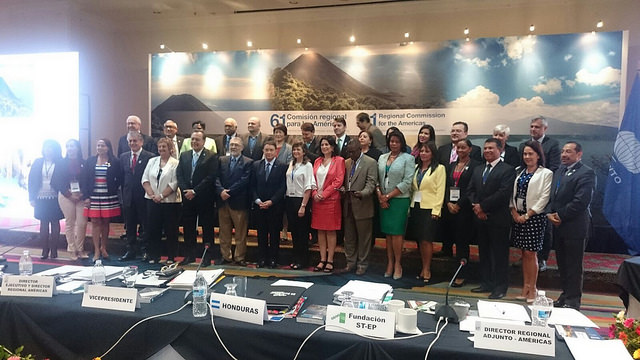
The 61st edition of the UNWTO Regional Summit for the Americas addresses the application of technologies to tourism
The World Tourism Organization (UNWTO), together with the Ministry of Tourism of El Salvador and the Honduran Institute of Tourism of Honduras, have jointly held the 61st Meeting of the Commission of the Organization for the Americas. The meeting, which took place in San Salvador and Roatán on May 30 and 31 respectively, has been culminated with an international seminar on new technologies applied to tourism .
The UNWTO Americas Summit (CAM) was held for the first time in two locations – in the Salvadoran capital and in Roatán, Honduras – and was attended by 20 delegations from 24 Member States. 13 Affiliate Members and relevant partners such as Amadeus IT Group were also present at the Meeting.
In a region clearly differentiated by its natural heritage, the celebration of the International Year of Sustainable Tourism for Development 2017 will lead the debates. The majority of Member States noted the importance of sustainability in sectoral policies as a key area beyond the global campaign of the International Year.
Countries such as Colombia and Nicaragua expressed their interest in expanding the social, identity and culture dimension that the concept of sustainability entails in order to make it an added value of its tourism sector. For its part, Costa Rica, a pioneer Member State in the commitment to sustainable tourism, pointed out the importance of working on sustainability from the educational system and in the family, emphasizing the need to involve the media.
The relationship between sustainability and new technologies was the main theme of the International Seminar held after the Regional Summit. Around 120 participants, both international and local, addressed the current trends in this discipline, especially in relation to the Big Data and the new platforms of tourist services.
The value of the International Network of Sustainable Tourism Observatories, one of the main initiatives of UNWTO in assessing the impact of the sector, was one of the points that generated more agreements in the Regional Meeting.
“We are in a region that presents a multitude of good practices related to sustainable tourism that can be beneficial in other areas of the world,” commented UNWTO Secretary General Taleb Rifai. The Secretary General of the Organization, who met with the President of El Salvador, José Sánchez Cerén, received during his visit the decoration of the liberator of the slaves José Simeón Cañas, the Great Gold Plate Cross. Also the Government of Honduras also decorated the Secretary General of the WTO, Taleb Rifai, with the order of Francisco Morazán in the degree of Great Officer.
The CAM 62 Meeting will be held in Chengdu, China, on 12 September 2017 within the framework of the UNWTO General Assembly.
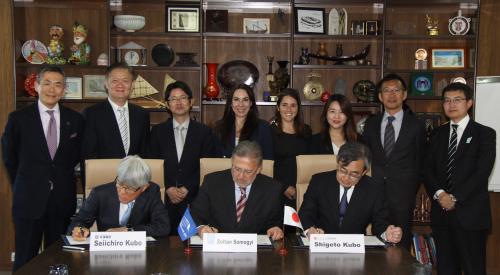
UNWTO and the JTTA partner to foster gastronomy tourism in Japan
The World Tourism Organization (UNWTO), the Japan Travel and Tourism Association (JTTA) and Gurunavi Inc. have undersigned an agreement to develop a “UNWTO Affiliate Members Report on Gastronomy Tourism: Japan.” The report will contribute to capitalize the potential of this segment in the Nippon country and add to the existing UNWTO research on gastronomy tourism.
Japanese cuisine has become a world reference and at present, Japan is the country with the highest number of restaurants awarded with 3 Michelin stars. In addition, Japanese gastronomy has been officially designated as an Intangible Cultural Heritage by UNESCO.
The Report will provide a global overview of gastronomy tourism in Japan and explores the potential of this segment as an instrument for inclusive development in the country. The publication will primarily deliver the findings of the extensive research conducted by two UNWTO Affiliate Members, the Japan Travel and Tourism Association (JTTA) and Gurunavi.
Data compilation will include interviews, surveys, research and field work conducted with stakeholders from both the private and public sectors. The publication will also include case studies and best practices in gastronomy tourism in Japan.
JAPAN TRAVEL AND TOURISM ASSOCIATION
The Japan Travel and Tourism Association, serving as a national center for Japanese tourism, is engaged in supporting travel and tourism to promote Japan as a tourism-oriented country. The Association contributes to promoting the growth of regional economies and the tourism industry, enriching Japanese citizen’s lives and culture, and encouraging international goodwill by creating attractive domestic sightseeing destinations, organizing wide-area tourism routes and energizing exchanges through tourism. The Association’s goal is to effectively promote tourism by supporting regionally based tourism promotion activities and through broad coordination between the regions and the tourism industry. The Association has 650 members nationwide engaged in tourism-related activities. They include local governments, tourism associations, tourism industry bodies, railways, airlines and tourism-related companies.
GURUNAVI INC.
Gurunavi, Inc. is an Internet search service provider, focusing on the provision of information for restaurants and the service of restaurants through personal computers, cellular phones and smart phones. They also offer marketing promotion services for restaurant operators. In addition, Gurunavi is involved in the sale of food products, the home delivery catering, wedding information and the travel-related businesses. As of April 1, 2016, the site had grown into a major website, with more than half a million restaurant profiles and listings, and 13.97 million members.
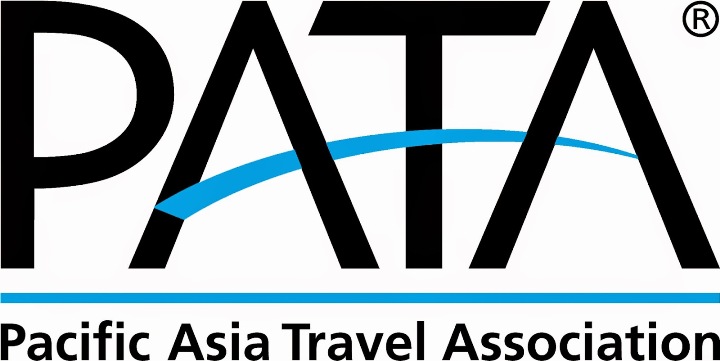
PATA reaffirms support to Paris Accord on Climate Change
BANGKOK, June 5, 2017 – The Pacific Asia Travel Association (PATA) is reasserting its commitment to sustainable development across the entire spectrum of travel and tourism with a renewed pledge to support the Paris Accord within the United Nations Framework Convention on Climate Change.
Embedded within this PATA advocacy theme is an acknowledgement and recognition that tourism must play an influential role in preserving the planet’s natural resources by adopting effective, sustainable practices.
“Our members, both public and private sector, are leading by example. They recognise that responsible business practices must embrace practical measures to offset the potentially irreversible damage to our planet caused by climate change,” said PATA CEO Dr. Mario Hardy.
Dr. Hardy has welcomed the responses and statement of leading business figures such as Apple CEO Tim Cook and Tesla Inc. co-founder Elon Musk as well as the Governors of several US states that, together, have also reaffirmed their commitment to combating climate change.
“Now is the time to reinforce our determination for the principles and objectives of the Paris Agreement under the United Nations Framework Convention on Climate Change. This agreement has now been ratified by 147 nations and territories. We encourage more nations to sign and to support practically the efforts to reduce carbon emissions,” added Dr. Hardy.
“The decision of the US government to withdraw from the Paris Accord is highly regrettable but it will not deter us from campaigning vigorously for effective measures to preserve and protect our world. This is an opportunity for tourism to lead by example. Environmental protection and preservation is above politics and way beyond the beliefs of individual politicians. Whether natural or man-made our climate is changing – and not for the better. PATA will continue to advocate responsible tourism development that benefits, rather than destroys, our communities.”

UNWTO condemns the attack in Manila
UNWTO strongly condemns the attack perpetrated in Manila yesterday.
On behalf of the international tourism community, UNWTO conveys its heartfelt condolences and sympathy to the families and friends of the victims and to the Filipino people.
“The Philippines is one of the most consolidated tourism destinations in the world. We are fully confident that this will continue to be the case and we look forward to meet in Manila next 21 June for 6th International Conference on Tourism Statistics: Measuring Sustainable Tourism, one of UNWTO’s major events. This will be the best expression of support and union against these hideous acts.” said UNWTO Secretary-General, Taleb Rifai.

UNWTO and WTTC present Open Letter to Malta Prime Minister
The World Tourism Organization (UNWTO) and the World Travel and Tourism Council (WTTC) presented the Open Letter on Travel and Tourism to the Prime Minister of Malta, Joseph Muscat. The Open Letter outlines tourism’s value as one of the world’s largest generators of jobs and a powerful driver of socio-economic growth and sustainable development. To date, the Open Letter has been received by 89 Heads of State and Government.
UNWTO Secretary-General Taleb Rifai congratulated Malta on its good tourism results and thanked the Prime Minister for placing tourism high in the agenda of the European Union during its current presidency. “Malta is playing a critical role in ensuring that tourism is recognized for the value it has for the economy and employment in the EU,” said Mr Rifai.
The Prime Minister expressed his full support to the sector as a key economic activity for Malta, one of the main drivers of economic growth, creation of quality jobs and overall improvement of Malta’s social fabrics. He said that the Maltese Government has for the last years adopted a new tourism strategy and that a firm commitment to sustainable development is currently high on the agenda. Dr. Muscat reaffirmed that tourism is much more than climate, cultural activities and historical sites, more even than new niches such as diving tourism, conferences and events, wedding tourism, cruise and luxury accommodation. “It is actually one of those areas through which we believe that wealth percolates to all sections of society in a direct manner,” said the Prime Minister.
David Scowsill, President and CEO of the World Travel & Tourism Council, said: “Travel and tourism contributed 2,425.5 million euros (2,706.1 million USD) to Malta’s GDP, which is 26.7% of the country’s total GDP, and supported 27.8% of total employment in the country. Our sector is a stimulator of economic growth and a creator of jobs. We commend the Maltese government for its commitment to travel and tourism, and its continuous efforts to drive growth while preserving the assets the beautiful island has to offer.”
Rifai also met the President of Malta, Marie-Louise Coleiro Preca, who during the meeting reiterated her belief that the tourism sector has the ability to build peace to create prosperity.
Both meetings were held coinciding with a UNWTO Masterclass on ‘Attracting Chinese Tourism to the Mediterranean Countries’ and an event on ‘Enhancing Europe’s Tourism Competitiveness through New Products’ organized in the framework of the Maltese Presidency of the EU.
On the occasion, UNWTO welcomed six Maltese companies to sign the Private Sector Commitment to the Global Code of Ethics for Tourism: Air Malta, Federation of Associations of Travel and Tourism Agents (FATTA); Gozo Tourism Association; Malta Hotels and Restaurants Associations (MHRA); Malta Chamber of Commerce, Enterprise and Industry; and Valletta Cruise Port. By adhering to the Code, signatories commit to implementing and promoting its principles in their business strategies and operations. To date, 514 companies and associations from 68 countries have joined this Commitment.
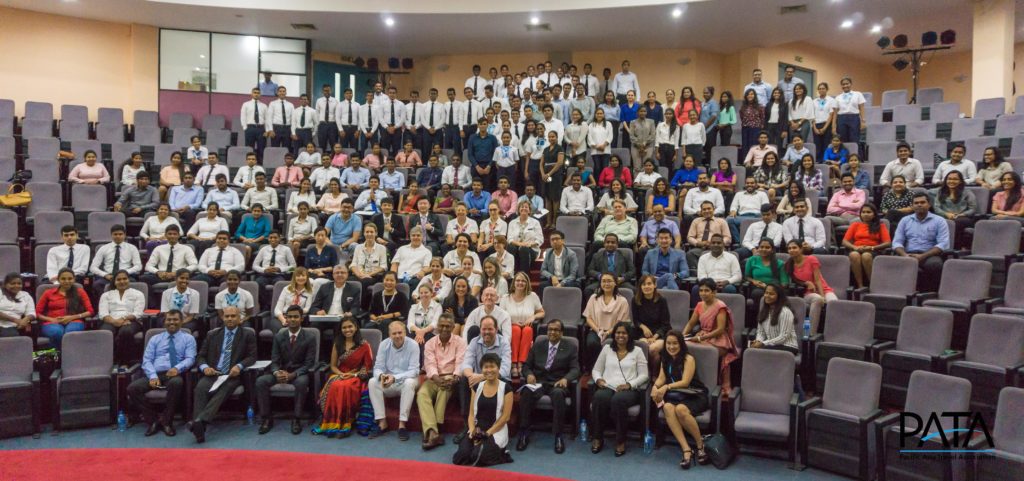
PATA Youth Symposium explores millennials and the future of tourism
BANGKOK, May 23, 2017 – The PATA Youth Symposium held on Thursday, May 18, 2017 in Colombo, Sri Lanka, welcomed 130 students, alumni and lecturers from various institutions from Sri Lanka, Australia and Macao SAR to discuss the next generation’s role in the future of travel and tourism.
The event, hosted generously by the Sri Lanka Institute of Tourism & Hotel Management (SLITHM) and supported by the Sri Lanka Convention Bureau on the first day of the PATA Annual Summit, was organised under the theme ‘No Barriers: Millennials and the Future of Tourism’.
In his opening address PATA CEO Dr. Mario Hardy stated, “The travel and tourism industry is a fun and exciting industry. Once you’ve joined you may never want to leave. It is about getting to know the unique cultures of various destinations, and I appreciate all the students who have joined us here to share their insights and thoughts on the future of the travel and tourism industry.”
Mr Hiran Cooray, Chairman of Jetwing Hotels, shared his experience of when he attended his first PATA event in Bali in 1991, noting, “By listening to many experience speakers, I started to think and absorb different ideas. For the younger generation, I encourage you to listen to experienced travel professionals. Some ideas might not make any sense to you now but it will make a lot of sense when you start working in the industry. We have the responsibility to look after our environment and our nature. If you don’t do that, nature will fight back. Remember the key messages shared with you and apply them every day as you take on more responsibilities for our industry and our environment.”
Mr Sunil Dissanayake, Chairman of the Sri Lanka Institute of Tourism & Hotel Management (SLITHM) said, “Millennials are looking for interesting and challenging work experience. The tourism and hospitality sector offers great opportunity for millennials in different roles”.
The programme was moderated and developed with guidance from Dr. Chris Bottrill, Chairman of the PATA Human Capital Development (HCD) Committee and Dean, Faculty of Global and Community Studies at Capilano University. Dr. Bottrill thanked the Sri Lanka Institute of Tourism & Hotel Management (SLITHM) and the Sri Lanka Convention Bureau for hosting and supporting the event. He also encouraged every student to actively participate in the discussions.
“We had a wonderful time with students from Sri Lanka Institute of Tourism and Hospitality Management and six other universities and colleges at the PATA Youth Symposium discussing millennials and the future of tourism. In our discussions, students noted the value of caring for the environment and their communities, embracing technology, providing healthy and organic foods, achieving gender equality, and the importance of embracing multiculturalism in our industry. We were very impressed with the insight that students showed toward the future of tourism and what their role in it will be.”
Mr Andrew Chan, Founder and CEO, ACI HR Solutions, Singapore, delivered the opening plenary talk on ‘Talent and Recruitment in the Tourism Industry – The future for Gen Y and Millennials’. He said, “A shortage of specialist skills in every Asian country is currently the greatest single challenge facing human resource departments. By 2020, millennials will form 50 percent of the global workforce. Up to 80 percent of the current workforce in some travel companies in Asia are millennials. Forty nine percent of millennials chose current travel industry job for the good opportunities in their career progression, making it the most important job selection factor. For millennials, development and work/life balance are more important than financial rewards.”
Ms Aleandre Kwan, Philanthropies Asia Programme Manager, Microsoft, Singapore talked about the ‘Corporate Commitment to Future Generations’. “More than 50 percent of today’s jobs require some technology skills, and experts say that this will increase to 77 percent in less than a decade. Microsoft’s mission is to empower every person and every organisation on the planet to achieve more.”
Mr Faeez Fadhlillah, CEO of Tripfez and the PATA Face of the Future 2017, talked about ‘Youth Entrepreneurship for the 21st Century’. He said that millennials were the first digitally native generation and tend to be active on social media. “Authenticity, values engagement, social validation, social acknowledgement are important to them.”
All participants shared their views in round-table discussions on the following topics:
Key responses from students to the question: What is important to the future Generation of Tourism Professionals?
1. Value of caring for the environment and their communities
2. Provide healthy and organic foods
3. Achieving gender equality, and the importance of embracing multiculturalism in our industry
Key responses from students to the question: How will Millennials and the next Generation Change the Future of Tourism?
1. Awareness of current situations and trends
2. Embrace the technology which can help you market products and services
3. Protect the environment
PATA Young Tourism Professional Ambassador, Ms JC Wong, informed the audience about PATA’s Young Tourism Professional programme and activities and the Association’s YTP student category membership.
The participants enjoyed fascinating cultural performances as part of the programme.
Photos from the event can be viewed here.
The PATA Human Capital Development Committee has organised successful educational events at various institutions including UCSI University Sarawak Campus (April 2010), Institute for Tourism Studies(September 2010), Beijing International Studies University (April 2011), Taylor’s University, Kuala Lumpur (April 2012), Lyceum of the Philippines University, Manila (September 2012), Thammasat University, Bangkok (April 2013), Chengdu Polytechnic, Huayuan Campus, China (September 2013), Sun Yat-sen University, Zhuhai Campus, China, (May 2014), Royal University of Phnom Penh (September 2014), Sichuan Tourism School, Chengdu, (April 2015), Christ University, Bangalore (September 2015), University of Guam, USA (May 2016) and President University (September 2016)
For further information, please view the programme here or email [email protected].

Joint Statement by the Caribbean Tourism Organization and International Union for Conservation of Nature on International Day for Biological Diversity
As the world comes together in recognition of the plethora of organisms and species that inhabit planet earth, the Caribbean Tourism Organization (CTO) is pleased to join with International Union for Conservation of Nature (IUCN) in celebration of International Day for Biological Diversity 2017.
This year, under the theme “Biodiversity and Sustainable Tourism” the CTO is particularly pleased that the global community continues to pay serious attention to the significance of tourism as a driving force for sustainable development.
CTO is acutely aware that the Caribbean is the most tourism-dependent region in the world, but it is not often recognised that there is a direct correlation between our region’s biological diversity and the scale of our tourism activity. Without question, Caribbean tourism products utilize the natural environment for myriad value propositions, and so whether one chooses to engage in whale-watching in Dominica, birdwatching in Trinidad and Tobago, snorkelling in the Cayman Islands or hiking in St. Kitts and Nevis, the biodiversity found in the Caribbean appeals to a wide range of visitors, and creates lasting observational and experiential memories for them to treasure.
In fact, the theme “Biodiversity and Sustainable Tourism” heralds a growing partnership between IUCN and the CTO, with one such output represented through IUCN’s sponsorship of the Biodiversity Conservation Award within CTO’s 2017 Caribbean Sustainable Tourism Awards.
We are remarkably blessed in the Caribbean with un-spoilt natural environments that not only lead to an enviable quality of life for our people, but the development of tourism as an economic pillar that allows us to share our rich habitat with the rest of mankind. It is therefore critical that we recognise and form partnerships with the champions that actively work to maintain balance with our sensitive biological treasures.
CTO and IUCN are pleased to collaborate to raise awareness and promote action towards the important contribution of sustainable tourism to economic growth and to the conservation and sustainable use of biodiversity.
Our actions matter, and CTO and IUCN are pleased to work together to ensure that the Caribbean remains mindful of both our environmental blessings and our responsibilities not just for present enjoyment, but for the benefit of future generations.
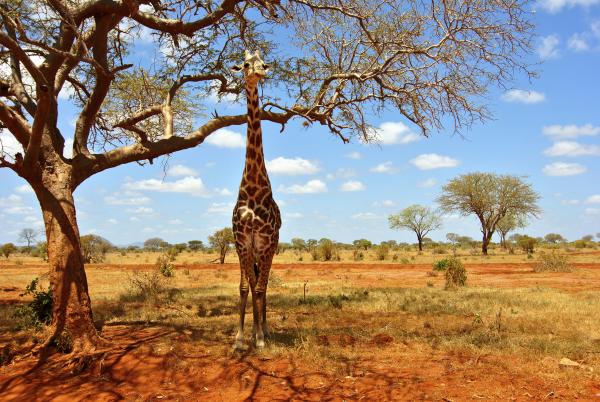
On the International Day for Biological Diversity UNWTO announces a training on tourism and biodiversity in West and Central Africa
The Convention on Biological Diversity of the United Nations has chosen ‘Biodiversity and Sustainable Tourism’ as the theme for the International Day for Biological Diversity, celebrated today 22 May 2017. On this occasion, UNWTO is launching a capacity building programme on sustainable tourism and biodiversity protection, to be implemented in West and Central Africa.
The programme will build on previous tourism and biodiversity seminars that UNWTO successfully delivered in The Gambia, Ghana, and Tanzania and will address biodiversity conservation and environmental protection, taking into account the importance of this topic to safeguard future opportunities for local people to generate income from sustainable tourism development.
The seminars to be held staring June 2017 will focus on building capacities of tourism stakeholders and on maintaining and improving the quality of the tourism product to enhance client satisfaction in the following countries: Benin, Democratic Republic of Congo, Gabon, Guinea (Conakry), and Niger.
Primary beneficiaries of the capacity building programme are tourism employees and small entrepreneurs at the grass root level who will be encouraged to act as champions for biodiversity conversation and environmental protection in their enterprises and communities.
The contribution of tourism to conservation is increasingly recognized by the international community. The Cancun Declaration on Mainstreaming the Conservation and Sustainable Use of Biodiversity for Wellbeing was released on the occasion of COP 13, (the 13th Conference of the Parties to the Convention on Biological Diversity) held in Mexico last December. The Declaration recalls that “tourism is an excellent vehicle to use in spreading environmental awareness worldwide, not to mention the livelihood support it provides for communities living in and around reserves and natural areas” and recognises that tourism can be an enabling agent of change.
Through these training seminars, UNWTO continues its long-standing work in strengthening capacities of tourism stakeholders in gaining a better understanding of the relationship between tourism and environmental protection, developing tourism products based on the unique biodiversity in a destination and using tourism development as an incentive to invest in biodiversity conservation and environmental protection.
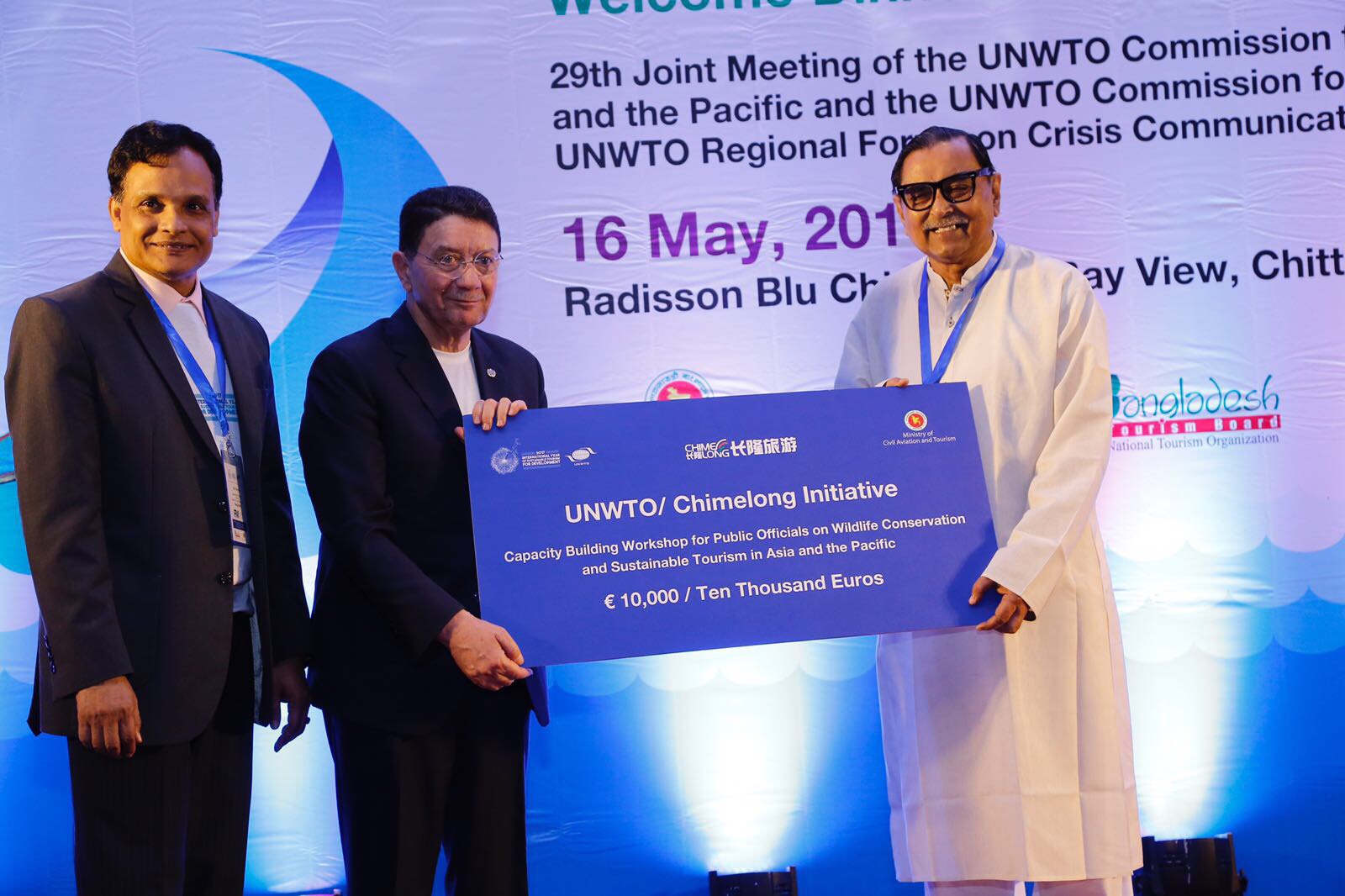
UNWTO Commission for Asia and the Pacific meets in Bangladesh
In 2016, Asia and the Pacific received 309 million international tourist arrivals, 9% more than in 2015; by 2030 this number is expected to reach 535 million. Over 20 countries gathered in Bangladesh on 16-17 May for the 29th joint meeting of the UNWTO Commissions for Asia and the Pacific and South Asia, to discuss challenges facing the sector in the region, opportunities for sustainable tourism development and the programme of work of UNWTO in Asia for the coming two years.
“With growth comes power, and with power, comes responsibility. With 1.8 billion international tourists foreseen to travel the world by 2030, we could end up with 1.8 billion opportunities or 1.8 billion disasters. These 1.8 billion travellers can and should translate into opportunities for inclusive economic growth, for more and better jobs, opportunities to protect our natural and cultural heritage, to better know and respect each other, to bond people, to distribute wealth and share prosperity,” said UNWTO Secretary-General Taleb Rifai, opening the event.
“Tourism can help us achieve the Sustainable Development Goals (SDGs). Your presence in Bangladesh will help us to support our tourism sector achieve its potential,” said the Minister of Civil Aviation and Tourism of Bangladesh, Rashed Khan Menon.
The meeting recalled the advances of the region in terms of visa facilitation, namely in Indonesia and India, in line with UNWTO’s priority to promote safe, secure and seamless travel. It also reviewed the work of the UNWTO technical committees on tourism competitiveness, sustainability, statistics and Tourism Satellite Account (TSA), and the activities being carried out at national level to celebrate the International Year of Sustainable Tourism for Development 2017.
Further items on the agenda included the transformation of the UNWTO Global Code of Ethics into an international convention and the creation of national committees on tourism ethics. Fiji was selected to host the 2018 Regional Commissions meeting and India as the proposed host country of the official celebrations of World Tourism Day in 2019.
Marking the International Year, UNWTO announced its support to Bangladesh in implementing capacity building programmes on wildlife and tourism within the UNWTO/Chimelong Initiative. Wildlife is one of the most important tourism assets of Bangladesh.
The joint meeting was preceded by a regional forum on crisis communication in tourism, with a step-by-step review of how to prepare a crisis communication plan and exchange of experiences in managing communication in situations of crisis, and of strategies for recovery.
